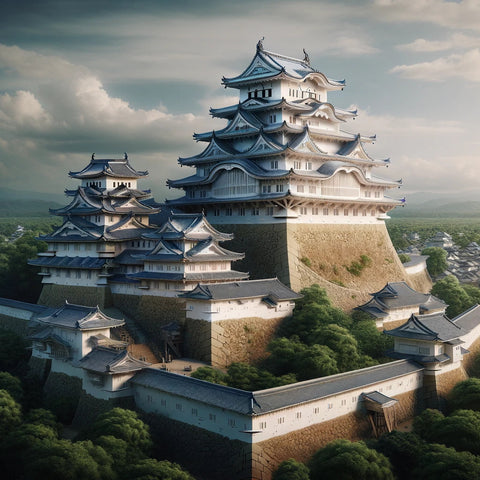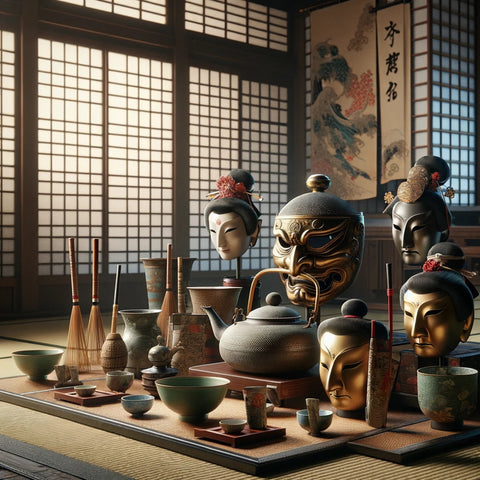Your Cart is Empty
Currency
Language

The Shogunate era, a period that profoundly shaped the political, social, and cultural fabric of Japan, was characterized by the rule of the Shogun, or military commanders. This era, spanning from the late 12th century to the mid-19th century, witnessed the rise and fall of various Shogunate governments, each leaving an indelible mark on Japanese history. This article delves into the Shogun's legacy, exploring their origins, roles and lasting influence on Japan.
The term "Shogun" is an abbreviation of "Sei-i Taishōgun", meaning "Commander-in-chief of the expeditionary force against the barbarians". This title was initially granted to military leaders responsible for suppressing rebellions and defending Japan against external threats, particularly during the Heian period (794-1185). The first Shogun, Minamoto no Yoritomo, established the Kamakura Shogunate in 1192, marking the beginning of samurai rule over Japan.

The Shogun was the de facto ruler of Japan, exercising military, administrative and judicial powers. While the Emperor remained the ceremonial head of state, the Shogun held the real political power, ruling through a feudal system that relied on the loyalty of vassal lords, or daimyos, who controlled their own lands and samurai warriors.
The Shogun was above all a military leader, responsible for maintaining peace and security within the kingdom. They mobilized samurai forces to quell internal uprisings, repel foreign invasions, and expand their territories. The military power of the Shogunate was instrumental in defining Japan's borders and establishing its status as a formidable power.
Beyond their military duties, the Shoguns also oversaw the administration of the country. They implemented land reforms, developed trade policies, and enacted laws that governed the lives of their subjects. The Shogunate established a bureaucratic system that managed everything from tax collection to public works, ensuring the efficient functioning of the state.
The Shogunate era also witnessed a flourishing of Japanese culture. The Shoguns and their samurai elite were patrons of the arts, favoring the development of traditional Japanese forms such as the tea ceremony, ink painting, and Noh theater. This period saw the creation of enduring cultural icons, including the samurai code, bushido, and the construction of iconic structures such as the Golden Pavilion in Kyoto or the various castles throughout Japan.

The Shogunate era ended in the mid-19th century with the Meiji Restoration, which restored imperial rule and initiated a period of rapid modernization and Westernization. The last Shogun, Tokugawa Yoshinobu, ceded power to the Emperor in 1867, marking the end of more than 700 years of military rule.
The legacy of the Shogun era is evident in many aspects of contemporary Japanese society. The samurai ethos of honor, loyalty and discipline continues to influence Japanese culture, while the architectural and artistic achievements of the period remain key cultural treasures. The governance structures of the Shogunate also laid the foundation for Japan's modern administrative and legal systems.

In conclusion, the Shogun played a pivotal role in Japanese history. Their governance led to significant military, administrative and cultural developments that left a lasting impact on the country. The Shogunate era, with its blend of martial prowess and cultural sophistication, remains a fascinating chapter in Japanese history.
The Disney+ series "Shogun" is a lavish historical drama based on the classic novel by James Clavell, set during the tumultuous civil war period of feudal Japan in the 1600s. It follows the epic power struggle of legendary Samurai Lord Yoshii Toranaga . The series is recognized for its meticulous attention to the cultural and political details of the period, capturing the essence of feudal Japan's complex social hierarchies and the intense struggle for power.
“Shogun” is notable for its mixed Japanese and international cast, which enriches the narrative with authentic and diverse perspectives. Hiroyuki Sanada stars as Lord Yoshii Toranaga, with Cosmo Jarvis as John Blackthorne, an English pilot whose ship ends up stranded, and Anna Sawai as Lady Mariko. The narrative interweaves the fates of these characters, exploring themes of loyalty, honor and culture clash.
The series premiered on February 27, 2024 and consists of ten episodes, offering a substantial story arc that delves deep into the political intrigue and personal dramas of its characters. It's available on various platforms, including Hulu, Disney+ via the Hulu hub, and FX in the United States, with international streaming through Disney+ (via Star) and Disney+ and Star+ in Latin America.
“Shogun” promises to be a visually impressive and emotionally gripping series that not only entertains but also provides insight into a pivotal era in Japanese history. Through its complex characters and meticulously crafted storyline, it aims to capture the imagination of audiences around the world, providing a unique window into the past that is both educational and deeply engaging.
Comments will be approved before showing up.
Order here to receive your box full of 25 Japanese sweets and snacks!
Receive the latest news about our new products and exclusive discount codes.
No spam, max 1 email per week.